- Hey Dullblog Online Housekeeping Note - May 6, 2022
- Beatles in the 1970s: Melting and Crying - April 13, 2022
- The Beatles, “Let It Be,” and “Get Back”: “Trying to Deceive”? - October 22, 2021
NANCY CARR * In the late 60s the Beatles had three strong songwriters (and really, was that fair to other bands?), and thus three distinctive ways of treating the subjects they wrote about—landscapes, love, drugs, etc. (That’s without getting into the significant variations within each songwriter’s work). This time, I want to consider what Lennon, McCartney, and Harrison saw when they looked at landscapes.
Lennon: “Strawberry Fields Forever” (released February 1967)

The physical Strawberry Field, in Woolton
Inspired by the grounds of the Strawberry Field children’s home in Woolton, this song proved so powerful that Lennon’s memorial in New York City’s Central Park bears the same name. That transposition works because the landscape of “Strawberry Fields” is almost wholly internal; listening to the song, you get none of the physical details of the actual place. “Strawberry Fields” is defined as a state outside the time and space grid, where “nothing is real.” There is a tree in the song, but it’s an absolutely metaphysical tree. When Lennon says “No one I think is in my tree,” it’s obviously a mental and emotional perch he’s talking about. Strawberry Fields can last “forever” because, as an internal state, it’s impervious to time and wear; there’s “nothing to get hung about.” Lennon’s dreamy vocal delivery, the paradoxical lyrics (“I think I know I mean a yes / But it’s all wrong / That is I think I disagree”), and the swooning melody combine to site Strawberry Fields firmly in Lennon’s mind. Being invited to join Lennon in Strawberry Fields (“Let me take you down”) feels like a privileged intimacy.
McCartney: “Penny Lane” (released February 1967)
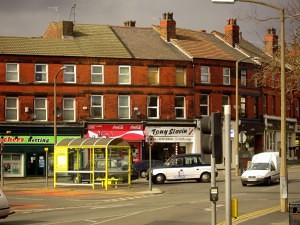
Penny Lane in Liverpool, with plenty happening “meanwhile”
McCartney’s song about childhood in Liverpool couldn’t be more different from “Strawberry Fields,” even though the two songs appeared on the same 45. Where Lennon’s foray into psychedelia produces a hazy, private interior landscape, McCartney’s produces a hyperrealistic setting populated by vivid characters in motion. And McCartney sounds deliriously happy that “Penny Lane is in my ears and in my eyes.” In “Penny Lane” we get enough details to visualize both the setting (“behind the roundabout,” “in the barber’s,” etc.) and the people (the banker, the pretty nurse, the fireman, etc.). The repetition of “Meanwhile back . . .” increases the scope of the action—so much is happening simultaneously that it’s a challenge to narrate. The ringing brass in the song is a wake up call, the sonic opposite of the lulling melody of “Strawberry Fields.” Lennon’s song offers an escape from concrete realities into a dreamscape; McCartney’s song is in love with the tangibility of the world, with everything that can be seen with the eyes and heard with the ears. Above all else, the song is in love with the populated landscape, with all the quirks, actions, and hidden moments that be glimpsed (the nurse who “feels as if she’s in a play”).
Harrison: “Blue Jay Way” (released November 1967)
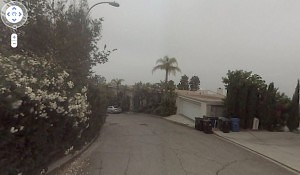
The house on Blue Jay Way where Harrison stayed
It’s telling that Harrison’s landscape song is about a street rather than a house, about a journey rather than an arrival. Harrison does offer details that establish the song’s physical setting (“There’s a fog upon L.A.”), but the fog is at least as metaphysical as Lennon’s tree. The dark, spooky music and treated vocals make the friends who have “lost their way” seem in peril of more than just being late enough to find that Harrison is asleep when they arrive. When Harrison sings “We’ll be over soon they said / Now they’ve lost themselves instead,” it’s not merely the route his friends can’t find, but their very selves. Where Lennon creates an internal landscape that stands alone, Harrison maps an internal journey onto a physical one. You may think you’re just trying to find someone’s house, but you’re actually on a spiritual quest.
Beatles landscapes: inside, outside, upside down
Reflecting on these three songs, it’s clear that one of the Beatles’ strengths was the band’s ability to bring the visions of its different songwriters to musical life. This ability would break down, and was never free of tension, but it’s worth pausing to appreciate that it did work so well for a time. That Lennon’s paean to the the inner world, McCartney’s pixilated love affair with suburban street life, and Harrison’s brooding exploration of the mirrored relationship between the inner and outer world were all released within the same year is also remarkable. The Beatles combined productivity with quality control like nobody else before or since.

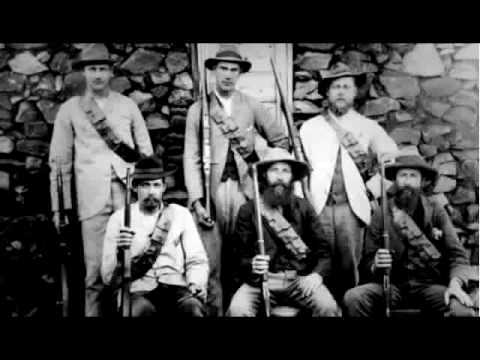

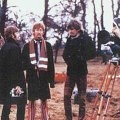

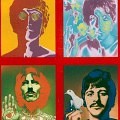
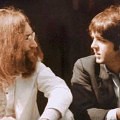
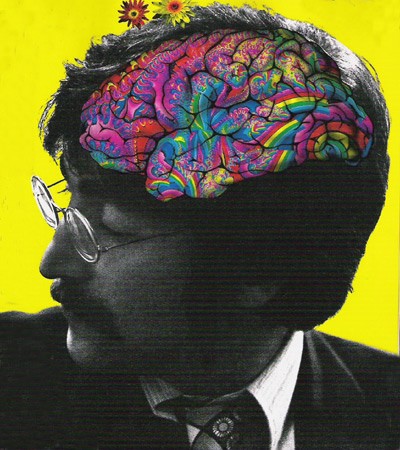

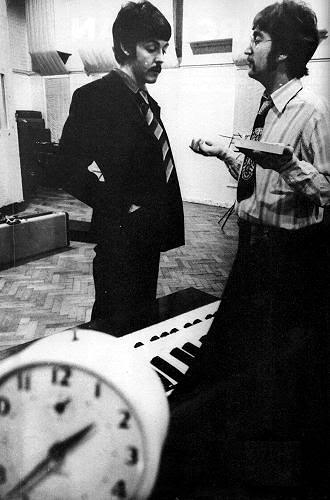
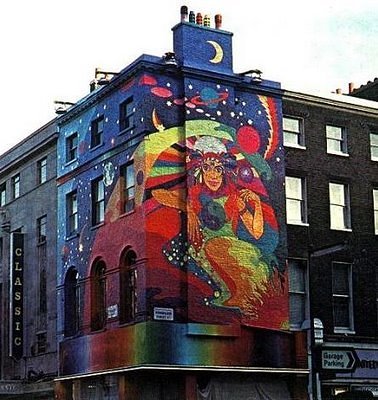
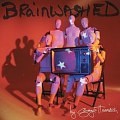

Excellent thoughts on these three songs. Here’s another tidbit of interest for you: Lennon’s “In My Life,” actually started out as what he remembered when taking the bus on Penny Lane. From what I’ve read, he cited the places the bus passed and his fond memories of those place. Ultimately, he felt it too much of a travelogue and instead turned the song into his memories of lovers and friends he still could recall. But it would be fair to say that the early attempts at “In My Life,” were definitely the precursor to McCartney’s “Penny Lane.”
“Crackerbox Palace” is one of my favorite George songs. After all these years, I’ve come to disregard the “beatles/post-beatles” label, and instead see their songwriting as one long river of beautiful music.
I’ve read different accounts of the meaning of this song. Some say it is a tribute to Lord Buckley‘s house. Others claim it is George’s own house. I always saw it as a song about a larger landscape: the entire world.
I don’t really see Penny Lane as “McCartney’s pixilated love affair with suburban street life.” It’s more complicated than that. For one thing, I know Paul uses the words “blue suburban skies” but, really, Liverpool wasn’t a suburb. it was a city. A fairly dirty, gritty city. And underneath the polish of this gorgeous song, you can see the grit: “He likes to keep his fire engine clean; it’s a clean machine” and “four of fish and finger pies are fairly obvious sexual references.
Also, this line: — “A pretty nurse is selling poppies from a tray; And though she feels as if she’s in a play,
She is anyway” — is one of the most psychedelic lines in any Beatles song. It’s not just happy-go-lucky Paul in love with a busy street. It’s Paul observing the strangeness of this not-so-simple world.
Just my 2 cents.
Good point about the sex in “Penny Lane,” Drew. It is definitely there, as is the strangeness. For the record, I intend “pixilated” in an entirely positive way here!
I agree with you, Drew. And Nancy’s right too. 🙂 In other words, Penny Lane operates on more than one level, which makes it such a great song. It’s both mundane and weird simultaneously.
Drew — I agree with your comment about Penny Lane being Paul’s observations of “the strangeness of this not-so-simple world.” But Penny Lane wasn’t in downtown Liverpool. It was in the middle-class suburb of Woolton, where John grew up, and it connected Woolton to Allerton, where Paul lived. Don’t know how far outside downtown Liverpool these suburbs are, but sufficiently enough to not be in the midst of the dirty, gritty city. Were Paul writing a song about Mathew Street where the Cavern Club was located, it would have been a far different tune, IMHO.
…correcting myself. It should be Woolton (sorry).
Small point – isn’t it “I think a no, I mean a yes”?
Nice piece, Nancy. Harrison’s song also includes some of his trademark sourness as well. His first song, though not spiritual, was Don’t Bother Me, and Within Without You, which is ostensibly very spiritual is strongly colored by his lamenting that others don’t see things correctly. His spirituality, at least at first, was often informed by this disappointment with the world and the urging of others to awaken to what he felt he’d realized. He was frequently sardonic about this, as he is in Blue Jay Way: His friends SAY they’ll be over but they’ve become lost instead. George says he may be asleep by the time they come over–like a threat that he’ll lose interest in these wandering souls if they don’t get their shit together.
Yeah, Chris—which is why I think George’s spirituality caused such resistance from Beatles fans. Not the spiritual part, but the sour judgmental aspects. It’s quite similar to John’s stance re: Yoko in that way. “If you don’t agree with me on this one point, you’re lost, an idiot, a fool.” Not only did this mutual flaw end up destroying their friendship, it speaks to a certain childishness in both men–that kind of fame and fortune bludgeons you back into a child, one who “must have his sweet way.”
The main difference, to me, in Beatles post-’67 is an incredible increase in sourness and judgment, frequently towards the fans. The Beatles were plenty political and interested in the avant-garde in 1966, but they weren’t disdainful. John and George particularly felt that they didn’t owe the fans anything, which I suppose is true—but then grew very angry when it was made clear that the fans didn’t owe THEM anything, either. Both men were running into the basic limitations of this reality, and blaming a bunch of strangers who bought their records.
Michael, I never thought about it in quite this way before, but you have made salient points. I’ve been a Beatle fan since the get go — well not quite. The first time I heard “I Wanna Hold Your Hand,” blaring from my older, teenaged sister’s transistor radio, I hated it. Thought it was noise and asked her to turn it off! Sacre bleu. Then, Ed Sullivan hit and for a little kid, I fell head over heals. The music pre 1967 was “happy music.” It made you feel good. However, as I grew up, and they grew up, I grew away from that need to immediately “rush out and buy the next single or album.” I did eventually get everything, but the music, although groundbreaking and interesting, I now called the “druggy music,” and it no longer made me “happy” in the same way the early stuff did. It could be the “sourness and judgmental aspects,” that you speak of. (Although Paul’s stuff was always more upbeat.)
Also regarding Penny Lane, it is both raining and sunny out at the same time. I agree with Drew and others here, Penny Lane is more than just a happy ode to childhood or a favorite street corner (although I know Nancy that you didn’t mean that necessarily and I agree with your piece). It is as psychedelic as any of their songs from this time period and probably more so. The lyrics are surrelistic and the upbeat tempo and melody are misleading.
Just want to reiterate that I think “Penny Lane” is quite psychedelic and complex. Back in 2011 I used it as one of the prime examples of McCartney’s novelistic tendencies on the old HD Blogger site. In a short song, McCartney is able to summon multiple characters and plots, as well as bend time and space (that “meanwhile”). It’s brilliant.
Rethinking this piece this morning, I realized that what I like most about “Penny Lane” is how social it is. John and George didn’t work that territory (with the notable exception of “Good Morning, Good Morning,” which could be John’s version of PL—does anybody know of GM, GM was conceived during the brief time when Pepper was going to be about Liverpool?).
Recorded: 8, 16 February; 13, 28, 29 March 1967 John said: “Good Morning is mine. It’s a throwaway, a piece of garbage, I always thought. The ‘Good morning, good morning’ was from a Kellogg’s cereal commercial. I always had the TV on very low in the background when I was writing and it came over and then I wrote the song.” (Credited to All We Are Saying, David Sheff, but this is in some interview. The RS interviews? A Playboy one?) Paul McCartney said in “Many Years from Now,” “John was feeling trapped in suburbia and was going through some problems with Cynthia. It was about his boring life at the time – there’s a reference in the lyrics to ‘nothing to do’ and ‘meet the wife’; there was an afternoon TV soap called Meet The Wife that John watched, he was that bored, but I think he was also starting to get alarm bells.” More on this song, when it was recorded, etc., here: http://www.beatlesbible.com/songs/good-morning-good-morning/
Linda, as stated before, I think John’s criticism of his own work—particularly his pre-Yoko work—should be taken with a grain of salt roughly the size of one of those deodorant crystals. My theory why he said this is a subject for another time, but “GM, GM” is clearly not a piece of garbage. Just as say, “Strawberry Fields Forever” wasn’t deliberately sabotaged by Paul and George Martin. But “GM, GM” does fit with “PL”/”SFF” in a way that the rest of Pepper doesn’t, so it’s an interesting thought–if you’re doing a Liverpool concept album, “GM, GM” fits.
BTW, here’s an interesting post on Pepper from the redoubtable Saki, who was Dullblog before there was Dullblog.
Michael, I didn’t say I agreed with JL’s assessment. Most of the time, it seems, he spouted off just to hear himself spout off. He liked to talk, n’est pas? Was only sharing the quote. Nor is there disagreement as to GM/GM fitting into the Liverpool concept album, which Pepper, however, never really turned out to be, or would you argue it did? For me, it’s more a concept about a fictitious band and some lonely hearts. That may be a very superficial perspective, but as a romantic by nature, it makes the most sense for me. Thanks for the link to the post on Pepper. Interesting, indeed.
Lovely three-way analysis, Nancy.
The dark, spooky music and treated vocals make the friends who have “lost their way” seem in peril of more than just being late enough to find that Harrison is asleep when they arrive.
I’ve always loved “BJW” for its spookiness. There is one very dark interpretation that I think works well, where the hinted-at disaster looms not over the lost friends, but over the singer: the suicide note theory. The most intense bout of “please don’t be long, please don’t you be very long, please don’t be long…” sounds truly desperate, like an urgent plea bubbling up through a drug-induced torpor. The repeated chant of “don’t be long” section could just as well be a mantra of “[I] don’t belong.” And I find it interesting that the song was written shortly before Brian’s death, and recorded shortly after.